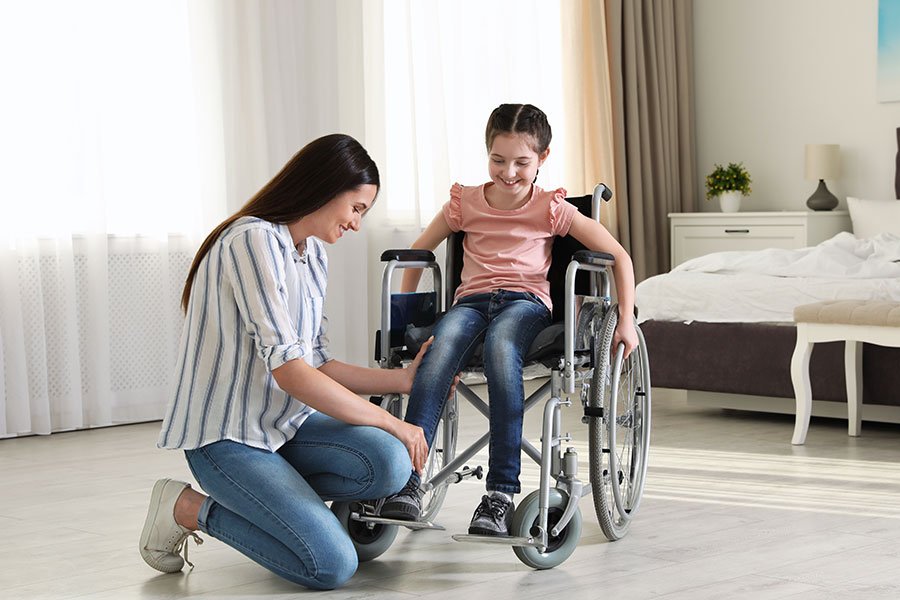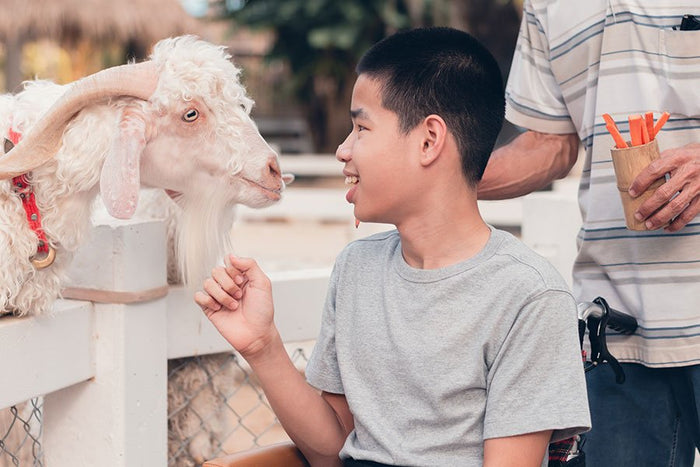-
What new parents of disabled children should know
-
If you’ve only just had a child who was born with a disability that will affect mobility, or have a child that may have developed a mobility impairment from a health situation or injury, these moments can feel like a lot to process. No one has children expecting to contend with additional challenges that a disability brings. As being a new parent can be full of new experiences in itself, parents of mobility impaired children have plenty more to learn than the average parent.
-
Patience: & planning
-
Patience and planning the day out
Being patient when it comes to parenting and having a plan are valuable for any parent of any child. When your child has a disability however, you may need to budget your time differently than you would with a child without a disability. The preparation to leave the house with a young child can be time consuming, but when mobility needs are taken into account, the process may be even longer.
From preparing mobility equipment to be packed down into a car to providing meals safely, a parent’s daily life is best taken slowly and without too many commitments each day.
Provided on your own energy levels for busy days, it’s sometimes easier planning one thing each day. Don’t avoid going out and doing regular new parent activities like social catchups – simply keep in mind that other parents’ time frames are not guides for yours.
With less packed in each day, patience is easier to keep. Remember, your child needs calm guidance, not a busy schedule.
-
![]()
Being: a kid
-
Milestones are unique to your and your child
Any parent will probably heard about or read about ‘milestones’; a way health providers measure development in children against typical time frames. Your doctor and occupational therapist (OT) will be able to provide more personalised guidance as to when or if your child will reach particular levels of mobility or other cognitive function.
Don’t get caught up in other parents sharing exact ages as to when their child rolled over, walked or used the toilet. Your focus is on your child, and the guidance your child’s doctor and other health providers give you.
With this said, achievements and milestones should definitely be celebrated within your family – children working through their natural growth and support from a physical therapist can take a significant period of time to manage a new movement, so make sure these moments are captured and enjoyed!
How OTs help your children enjoy ‘being a kid’
Occupational therapists are experts providing suggestions, resources, adaptations and alternatives to promote activity in a person with a disability’s daily life. They use these skills to build a plan which includes people, equipment and processes to give their client as good a daily life as possible.
These therapists work with all ages, with some even specialising in young children and babies. If you’re brand new to the world of mobility impairments, your OT will be an excellent source of support around how to provide the best care for your child. They can support you as the parents with best practises around supporting your child like carrying or lifting, onboard you with equipment and even help apply their experience to support your child to enjoy typical ‘kid’ activities.
This could include:
- Going to the park.
- Swinging on a swing.
- Visiting the beach, including feeling the sand and ocean.
- Coming to daycare/kindergarten to interact with other kids.
- Ride on a bike.
- Play with toys at home.
The amazing thing about the global OT community is their job is dedicated to allowing clients to live fulfilling lives. There are many strategies to help children enjoy their childhood while navigating a disability. Chat to your OT about options that would make sense for your child.
Tap into your children’s passions and nurture these in any way you can
From the time your child starts communicating, you’ll start to build an idea of the things they’re interested in. If your child has only mobility impairment but no communication challenges, you can work with your child as they become more proficient in speech to understand what they like. Even a child whose disability may extend to affecting speech can often react to things that build a picture of their likes and interests.
Don’t limit your child’s options as to what they do for fun – even some of the more ‘active’ interests have ways of including a child with a disability. Does your child love cars? Why not visit a racetrack or car museum? Do they have a favourite film or TV character? Make a trip to the movies. With a bit of local and online research you can find more physical activities made available to disabled kids – things like modified bikes for example.
Finding a child’s passions empowers parents to demote disability from the point of their children’s life to simply a detail. This is a great practice to get in from an early age, as the child grows up with a rounded perspective on life beyond their mobility challenges.
-
![]()
Relax and enjoy: your kids
-
Dedicated time to relax and enjoy your kids – outside of the routine
Your entire world can suddenly change when having a child with a disability. It can feel like your only job is to look after your child, with everything else being unimportant. This is not the case. As you start to learn about what your new normal looks like, it’s vital that you retain other parts of life. Relaxing and enjoying your family should absolutely not change with a disabled child. Whether they’re an only child or you have multiple kids, a family needs to bond and have fun together.
As your child grows up and becomes more aware of what’s happening around them, the feeling that they fit into a family as opposed to being a ‘responsibility’ of the family is far more constructive to their sense of belonging.
While a daily routine may be detailed for someone with significant mobility impairments, it’s a good idea to ‘plan unplanned time’; that is times in the week where the family enjoys free time or goes somewhere like the beach to relax and unwind. This downtime might even just be in the backyard or the lounge in front of the TV. Taking these moments to jump off the daily grind and appreciate your family helps keep everyone grounded.
-
Look after: yourself
-
Make sure you look after yourselves properly
Neglecting your own wellbeing through the justification of looking after a disabled child is not a helpful perspective. In fact, your child relies on their parents being their best. When a parent burns out, it’s often due to pushing hard with their child’s care, but failing to eat, sleep or exercise enough. The human body can sustain incredible endurance long term, provided we get the nutrition and rest we require.
It’s the role of both the parents to ask for help, but those around the parents and the OT to help out when needed so that the parent can take some time for themselves to remain healthy and happy.
Self care may extend to therapies like counselling; particularly valuable for parents struggling with adjustment to their new reality. In what’s commonly referred to as ‘doing the work’ talk therapy provides a tremendously valuable outlet for parents of disabled kids to express their fears, challenges and emotions in an environment where they may come away equipped with some new ‘tools’.
Staying happy, fit, rested and fed isn’t a selfish act; quite the opposite – disabled children get the most from parents who look after themselves properly, too.
Finding time to do this seems difficult? Make sure you speak with everyone in your support system from friends to health providers. Respite and in-home care can be accessed in many countries, taking the load off mum and dad at certain times a day or throughout the week.
Take pressure off yourself – you aren’t expected to know everything
One of the gifts disabled children provide is a valuable lesson in empathy and patience. What parents should remember is that application of patience needs to extend to oneself. There will be moments on your journey where you feel like crying and plenty where you’ll be laughing.
All parents who raise someone with a disability have extra responsibilities they need to deal with each day; don’t do yourself the disservice of expecting perfection every day. You will make mistakes – every parent does.
Ask for help, ask questions of your occupational therapist and simply go through the process of learning how to be a parent.
Connect with other parents going through the same thing online or in person
The community of parents raising disabled kids is enormous globally, and almost everywhere in the world will have local communities of parents going through the same thing you are. Having groups you can chat to and share experiences with locally isn’t just valuable as a means of therapy, but will build strong friendships. These friendships can turn into mutual support systems, whereby you can arrange catch ups, help to carpool and go through the process together.
To find these groups, your first port of call should be online; both search engines and social media can quickly show you local groups that you can enquire about joining. Local groups have the advantage of being able to catch up in person and build more meaningful friendships, but online communities with parents from the world over are also excellent to share ideas and support each other.
The digital age has allowed us to be more connected than ever. For parents of disabled children, this is a truely game changing resource and source of help.
-
Your: journey
-
Remember you’re doing something incredible
No one outside of other parents of disabled kids knows what this journey is like. At times, when you’re ‘in the trenches’, it can feel like a challenging process. But ensuring you look after yourselves and tap into the community and health support available will help to keep things on track.
Don’t ignore the fact that you’ve been given one of the most important jobs anyone can have – and a rewarding one at that. At your child’s side, you’ll be empowering them to live a fulfilling childhood.
-
More info
-
More information about this topic:
You can find useful information about this topic across the web via the following excellent online resources:
- Survival Tips For Special Needs Parents…You’re Not Alone, I Promise! – The Center for Parenting Education
- What I Would Tell You – By Julie Keon via Abilities.com
- Advice for Parents of Children with Special Needs – The Chaos and the Clutter
- When You Learn That Your Child Has a Disability – by Carole Brown, Samara Goodman, and Lisa Küpper via the Center for Parent Information and Resources
- The Early Years (0–6) – Advice and information for those caring for a disabled family/whānau member – carematters.org.nz
Learn more about Showerbuddy’s range of mobility products
Showerbuddy provides solutions for mobility-impaired children. Head over to our petite range page to explore our purpose-built shower chairs. Adaptable options for children of any age.



